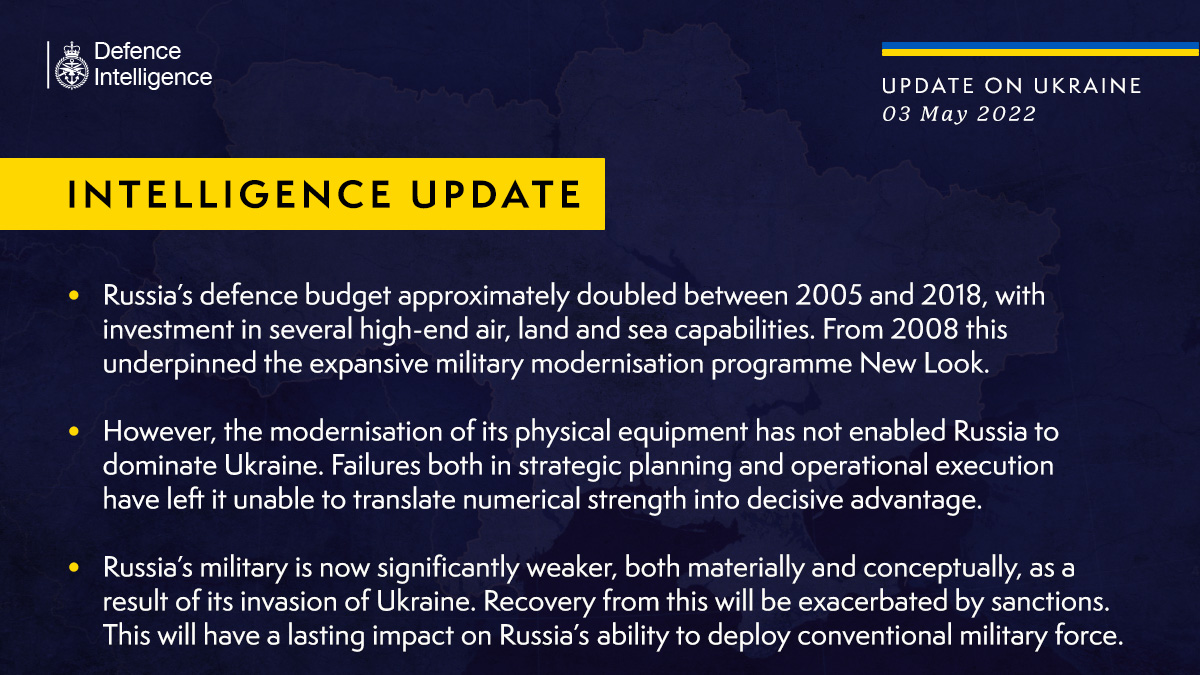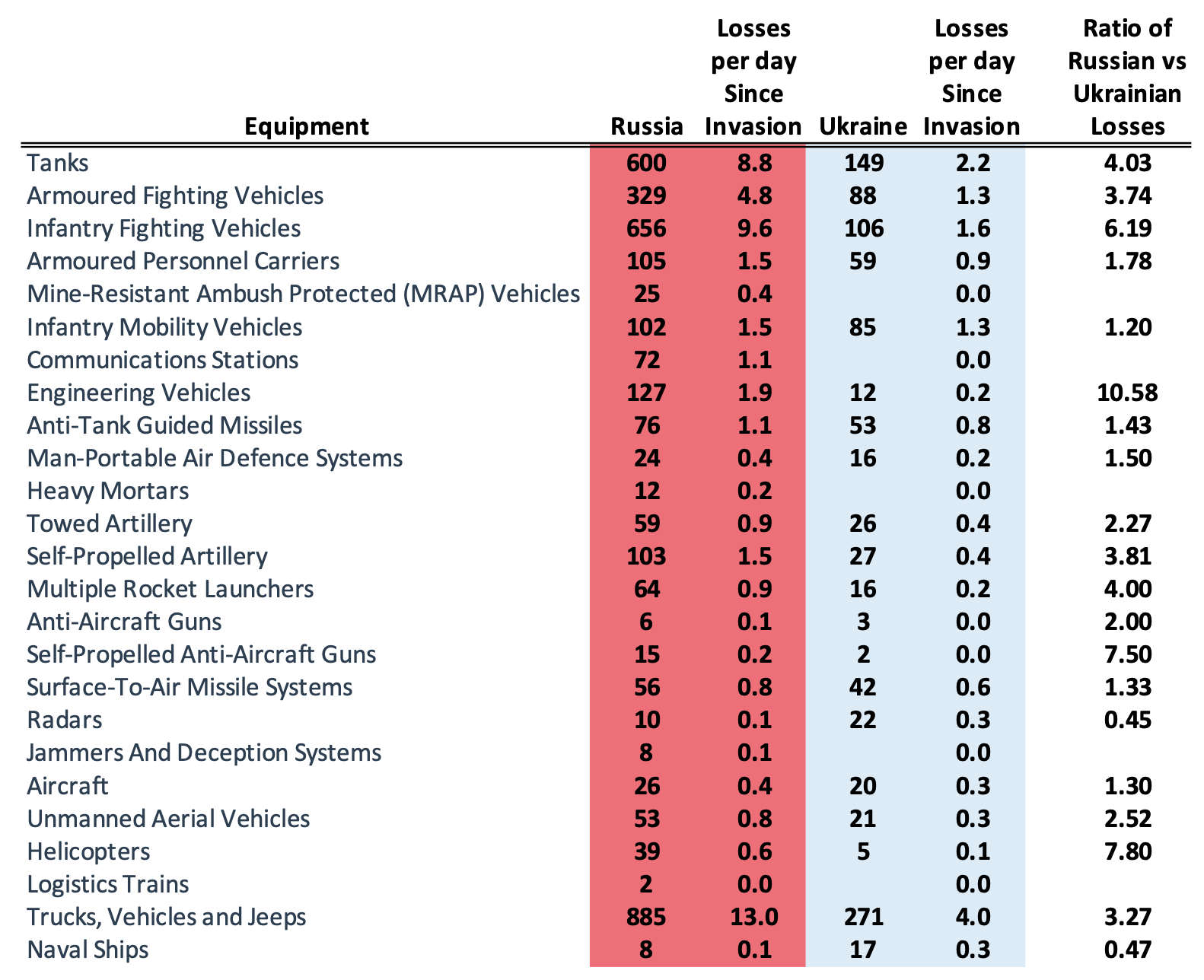The Ukraine war thread
-
Since Putin's military wasn't ready to take on Ukrainian forces, than how is his military supposed to take on NATO forces?
-
On the diplomatic front, the article surveys global responses to the Russian invasion of Ukraine, and points out that many populous countries refuse the take side (some discussion on why), hence if weighted by population, only a "minority" of the world condemns Russia. Most of them are not taking side, including India and Indonesia, the two most populous democracies in the world.
Various reasons (justified or not) were cited by various countries on why they do not want to take side. One reference to Cuba stood out, a parallel comparing Russia's unease with having a democratic Ukraine at its border to the USA's unease with having a communist Cuba so close to the USA. First time I've seen this argument reported in American press.
-
On the diplomatic front, the article surveys global responses to the Russian invasion of Ukraine, and points out that many populous countries refuse the take side (some discussion on why), hence if weighted by population, only a "minority" of the world condemns Russia. Most of them are not taking side, including India and Indonesia, the two most populous democracies in the world.
Various reasons (justified or not) were cited by various countries on why they do not want to take side. One reference to Cuba stood out, a parallel comparing Russia's unease with having a democratic Ukraine at its border to the USA's unease with having a communist Cuba so close to the USA. First time I've seen this argument reported in American press.
That Cuban analogy has been around for some years particularly among US analysts. One of its leading proponents is John Mearsheimer. I am surprised you haven’t come across it before as Mearsheimer is widely quoted throughout the English language media.
For the record, I do not believe it to be a valid comparison in the Russia Ukraine War.
-
Now Germany has promised to deliver some much-needed artillery. From what I understand, the "Panzerhaubitze 2000" is pretty decent.

In December 2013, Raytheon and the German Army completed compatibility testing for the M982 Excalibur extended range guided artillery shell with the PzH 2000. Ten Excaliburs were fired at ranges from 9 to 48 km. Shells hit within 3 m of their targets, with an average miss distance of 1 m at 48 km.
Average miss distance of 1m at 48km? I have no idea how that compares to other similar systems, but that sounds pretty impressive to me. Oh, I just see that this accuracy is only when this particular super-expensive shell is used. Now I wonder how accurate the "normal" shells are.
I still wish we'd deliver much more weapons, and faster, but at least it's moving in the right direction. I'm afraid, though, that the time window in which the weapons can help is slowly closing.
-
The M-777 155mm howitzer the U.S. is sending to Ukraine is notable for a few things...
- There is titanium used in certain parts, making the gun lighter than the Russian 152mm howitzer. The M-777 is air mobile.
- The M-777 out ranges the Russian gun.
- The U.S. is sending enough rounds, that the tubes will be shot out before the ammo is exhausted. What the U.S. is not doing, is supplying Copperhead rounds.
A good crew can emplace the gun in a little over ten minutes, then fire five rounds per minute using the M-777's GPS system.
-
Remember, these numbers are only the losses that can be documented with photo verification. I'm sure the losses are higher, much higher than this.
The other thing to remember is that, for example, it's not just destroyed materiel....
For Russia:
- Tanks (600, of which destroyed: 313, damaged: 17, abandoned: 49, captured: 221)
- Armoured Fighting Vehicles (329, of which destroyed: 161, damaged: 1, abandoned: 37, captured: 130)
- Infantry Fighting Vehicles (656, of which destroyed: 395, damaged: 6, abandoned: 46, captured: 209)
Lots and lots of captured equipment that will be returned to the fight. I remember seeing a story claiming that the number of tanks that Ukraine has is now actually larger than at the beginning of the war.
For Ukraine:
- Tanks (149, of which destroyed: 64, damaged: 1, abandoned: 8, captured: 76)
- Armoured Fighting Vehicles (88, of which destroyed: 33, abandoned: 4, captured: 52)
- Infantry Fighting Vehicles (106, of which destroyed: 53, damaged: 3, abandoned: 9, captured: 41)
-
-=-=-=-=-=-=-=-=-=-=
Rumours are swirling in Moscow that a number of former generals and KGB officials are preparing to oust Russia’s president Vladimir Putin and plan to end the war in Ukraine, which is increasingly seen across Russia as a strategic mistake and, above all, an economic disaster.
The top of Putin’s former employer – the Russian security service FSB – is said to be so frustrated about the lack of military progress in Ukraine that it has reached out to a number of generals and former army officials, according to various analysts and local media reports.
In particular a group called the ‘Siloviki’ – which comprises of former FSB officers who are active in Russian politics – is said to be pushing hard to replace Putin, together with former officers from the GRU, KGB and FSO, other Russian intelligence units.
The idea a coup may be imminent is further strengthened by social media activity across Russia and Eastern Europe, which has gone into overdrive in the last 24 hours.
Moreover, analysts in and outside Russia have said all signs are there that Putin will face a coup soon.
The Russian president is reportedly “very worried” and has tightened security in and around the Kremlin.
“Does it matter? It matters a lot,” said Russian security expert Andrei Soldatov told The Center for European Policy Analysis.
“The Russian President has been bracing for a coup for some weeks as has faced fierce criticism over his “special operation” in Ukraine and he has purged around 150 of his spies over the constant failures,” Soldatov explained.
“This is the very first time the siloviki are putting distance between themselves and the President. Which opens up all sorts of possibilities.”
Russian security expert Andrei SoldatovnoneMoreover, rumours are also going round Putin’s health has taken a hit since the start of the war. On a number of videos the Russian president looks tired and irritated.
It has become evident that the relationship between the FSB and Putin has deteriorated since the start of the war.
Last month, two senior officers in the FB, were put under house arrest by Putin.
Andrei Soldatov who runs, the well-informed investigative website Agentura, reported that Sergei Beseda, the head of the Fifth Service – the FSB’s foreign intelligence branch – and his deputy had been detained and put under house arrest.
The move was seen as a clear sign Putin is deeply concerned about the FSB’s role in the offensive against Ukraine and he fears forces within the intelligence apparatus may be working against him, Western officials told the Agentura platform.
“Both men have played a major role in intelligence operations against Ukraine for several years and highly likely played a major role in the planning for the invasion,” one said.
“There could be significant changes at senior levels in the FSB.”
Russian analyst Alexey Muraviev is also convinced that the Russian President is facing a coup from his top military and intelligence chiefs.
Muraviev told Sky News Australia that an attempt to remove Putin may be imminent because “I think that there have been tensions between Russia and the intelligence community and Russia’s President Vladimir Putin.”
“Clearly, there’s been a clear error of judgment that was made and it was probably driven by Putin himself about the situation in Ukraine.”
Russian analyst Alexey Muravievnone
“I think that sort of false narrative was presented to them by the Supreme Commander in Chief, and when it fired back when the Russians began taking heavy casualties, Putin began quietly blaming the security services,” he continued.
“I don’t think went really well also because he’s coming from within the security apparatus.”
“About the initial planning and the initial phase of the invasion where the Russian military naturally assume that they’re going there as liberators rather than the invaders,” he explained.
When approached by City A.M., no one at the Kremlin was available to comment.
-
‘They Deceived Us at Every Step’: Troops Say Russia’s War Is in Shambles
Troops sent into Ukraine to back up Russian forces say they had no choice but to leave because Russian military was in shambles and “they deceived us at every step.”
Soldiers from the breakaway state of South Ossetia—speaking to South Ossetian leader Anatoly Bibilov at a meeting publicized by the independent news outlet MediaZona—rattled off a list of complaints about faulty equipment, lack of leadership and intel, and brainless tactics.
South Ossetia, which relies heavily on military and financial aid from Russia, sent troops to Ukraine in late March to “defend Russia.” Ukrainian military officials said at the time that some 150 South Ossetian troops were joining forces with Russia, but Tskhinvali never gave any official figures.
Many of the soldiers are said to be part of Russian military units based in South Ossetia; Moscow and Tskhinvali struck a deal in 2017 to partially incorporate their armed forces.
But reports soon surfaced of many of them refusing to take part in the fight, vowing not to become “cannon fodder.”
“Nobody got scared here, it’s just that they deceived us at every step,” one of the soldiers told Bibilov of their decision to abandon the fight.
“Of the 11 days [that we were there,] I wouldn’t even wish on an enemy what happened there. All the equipment didn’t work, I’m telling you straight… There was no command staff,” another soldier told the South Ossetian leader.
Out of 10 tanks, the first soldier said, only three fired. “The artillery mortar for the mortar-gunners didn’t work, the legs were all crooked,” he said.
“There was no command. And if the officers didn’t know what to do, what is the sergeant doing there?” another soldier was quoted saying.
He said “99 percent of the equipment” in another unit didn’t even work, but when the troops warned the senior in command that their vehicles didn’t work and their guns “did not fire,” he shrugged it off and said to just “go like that.”
In another case, troops complained of their commander “disappearing” every time fighting started.
“He was afraid of his own men. He made himself a security team out of a few of the guys. The commander refused to come out and talk to his own guys and was saying that he’d be beaten,” one soldier said.
Eventually, “some guys from spetsnaz [special forces]” really did beat him and left his “face all bloody,” he said.
They said the Russian troops never had backup plans, or escape routes. Another soldier said one of his wounded comrades in Russian-occupied Donetsk was getting no medical care.
“He says that the first day they bandaged him, but there’s still shrapnel inside him. He says his hand is very swollen, and nobody is doing anything, the doctors aren’t even coming to see him. He’s been there for five days, and the doctors are only asking him for money,” he said.
After hearing the soldiers paint a picture of such utter dysfunction, Bibilov asked the men directly if they believe Russia will lose the war.
One soldier spoke up: “Yes, we believe they will lose.”
-

